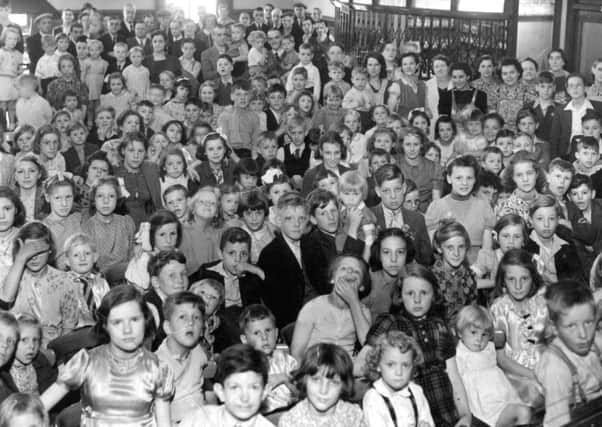NOSTALGIA: Back to the day when working men's clubs were king


They were delighted to see the picture of a pub trip but were sad that so many clubs and pubs in the area have closed down. We all remember when almost every working man in the area belonged to such clubs, but it seems that working people no longer need the support or entertainment that places like these once provided.
My family, like thousands of others in this area, were members of such clubs, and as children we benefitted greatly from them, not only with club trips, but also parties of various kinds, including extra special ones at Christmas.
Advertisement
Hide AdAdvertisement
Hide AdThe elderly also benefitted because they organised trips for them also, as well as providing old folk’s treats at various times of the year, often regarded as so important and prestigious that the Mayor and Mayoress were invited to take part.
They also expected a journalist and photographer from the Reporter to be present to make sure that the event was well covered in the paper. I was invited to many when I was a young journalist.
When I write about working men’s clubs, I admit that I do tend to write about the ones my family were members of, namely, Eastborough Working Men’s Club, the Irish National Club in Westtown, and the Sawdust on Vulcan Road, because I have personal experience of them.
Sadly, only one of these, the Irish Nash, still survives, but I believe they are struggling too with dwindling membership. I wonder if they still have enough supporters to whip up a club trip for the children.
Advertisement
Hide AdAdvertisement
Hide AdFortunately, we do still have some active clubs in the district for those who still enjoy club life, but so few you can count them on one hand.
I would like to know if those clubs still operating manage to organise children’s trips to the seaside, and if they do, please take some photographs because we need to file them away as an important part of our social history.
To my mind the most important aspect of these club activities was that they were entirely free, and even pocket money and free lunch and tea were provided for the children.
It is true there were lots of churches and other organisations, and places of employment which organised similar trips to the coast, but I doubt if many of them were free.
Advertisement
Hide AdAdvertisement
Hide AdMany poor children got to see the seaside for the first time thanks to the working men’s clubs, and the men who ran them. Most of these men are no longer with us, but I send a prayer of thanks to them all for the happiness they gave to so many children from Dewsbury.
The most recent club to close down in Dewsbury was Eastborough Working Men’s Club in Battye Street, which closed last year.
It went quietly without fanfare after struggling for years with falling membership, which came as quite a surprise to the world of working men’s clubs, because it had been one of the biggest and most prosperous in the area.
No club had a prouder history or did more for its members and local community, for over the years it raised vast sums of money to help build local hospitals.
Advertisement
Hide AdAdvertisement
Hide AdAnd, during the hard times, like the General Strike in 1920, they provided financial help for members hardest hit and they also turned the club into a soup kitchen for the needy.
The club had started from humble beginnings in 1910, and grew to be the biggest and most successful club in the area. It was started by a few men from Eastborough who got together to discuss the possibility of forming such a club in their local community.
They held meetings at various places in the town, including a room over the Maypole Dairy in Northgate, and after many such meetings it was decided to rent an empty building in Battye Street.
Many volunteers came forward to clean and decorate the premises, and the club was opened on 10 November 1910, and was an immediate success. Within two years, the committee were able to buy the premises for £650, and the following year bought land at the corner of Battye Street and Camroyd Street, to build bigger and better premises.
Advertisement
Hide AdAdvertisement
Hide AdThe club’s rapid progress was slowed down somewhat when World War One broke out in 1914, for most members went to fight in the war, many of whom were never to return.
In 1936, the old club in Battye Street was sold to the Salvation Army for £350, and a new club was later built which had a massive concert room attracting some of the top acts in the country.
On opening night, the club was packed to overflowing. No-one could have foreseen that night that this prosperous club with one of the highest memberships in the country, would one day close its doors through lack of support.
Fortunately, we still have a few clubs left in Dewsbury, which seem to survive mostly in villages where there is a strong community spirit like Earlsheaton, Westborough and Hanging Heaton.
Advertisement
Hide AdAdvertisement
Hide AdI’m not sure if there is still a working men’s club in Dewsbury Moor, Thornhill or Ravensthorpe, but I know that Morton House in Thornhill Lees is still going strong, and the Socialist Club in Bradford Road.
The photograph this week was taken at a Christmas party at the Eastborough club many years ago, and was given to me by Bill O’Donnell, who came from Eastborough and whose parents were members.
Anyone with any photographs of club trips or events at working men’s clubs – and pubs – please let me know. Email [email protected], or ring 01924 433013.